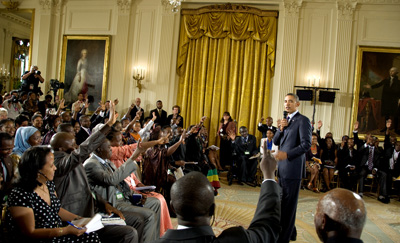The venue for Thursday’s event, a conference center named after the publisher John S. Knight, was perhaps fitting after the forum’s Tuesday town hall meeting at the White House featured significant references to press freedom. Addressing 115 of the brightest and most enterprising 20- to 30-something leaders in activism, business, health, innovation and media in Africa on Tuesday, Obama singled out, among others, a Botswana journalist (Itumeleng Ramsden) for inspiring young people with her popular radio show, and a journalist from Ivory Coast (Aminata Kane Epse Kone) for championing the cause of Muslim women on her radio station. In a Q&A session, the president mentioned press freedom while praising the ability of youth to challenge the status quo.
“In some of your countries, freedom of the press is still restricted,” Obama said. “There’s no reason why that has to be the case. There’s nothing inevitable about that. And young people are more prone to ask questions, why shouldn’t we have a free press?”
Bold and unprecedented, the administration’s approach to honor this ambitious Facebook generation (and there were numerous references to the social networking platform on Thursday, and not only from the participants), clearly raised eyebrows outside the U.S. At the end of Thursday’s event, columnist and activist Tiémoko Antoine Assale, a delegate from Ivory Coast, told the audience how, before his departure, he received a phone call from a government official who was upset because he had not received an invitation from Washington.
As noted by the New York Times‘ Adam Nossiter, Washington’s approach was a dramatic departure from France’s recent gathering of leaders of its former colonies during Bastille Day celebrations in July. The keynote event of those celebrations was a military parade featuring African soldiers. They marched on the Champs–Élysée along with French troops, and the sound of their boots drowned out local and international civil society protests over human rights and democracy concerns. French media quoted TV presenter Etienne Leenhard of state-funded France 2 as saying on the air that “Politically speaking, there are no dictatorships in Francophone Africa,” as he gestured over a map of the continent.
In Washington however, the U.S. State Department engaged the participants in thematic focus groups such as leadership, entrepreneurship, social responsibility, interfaith dialogue, and even “Advocacy, Transparency, and Human Rights.”
African governments dominate, monopolize, or politically censor national public media, but in many countries, government outlets are the only ones with the capacity to broadcast to the entire population. This leads to the suppression of voices of civil society or the opposition during election cycles. For instance, Welcom Romell Nzaba Nodjitolom, a human rights jurist from the Republic of Congo, described how the elite in power controls four of the five TV stations in his country. According to our research, in the Republic of Congo, there is the state-run Télé–Congo (considered to be the mouthpiece of the government), private DRTV (owned by Army General Norbert Dabira), private Top TV (owned by Claudia Nguesso, the daughter of President Denis Sassou-Nguesso), TV Réhoboth (owned by pastor Germain Ndéké, a maternal uncle of the president’s late wife Edith), and a fledging newcomer, MN TV, named after the president’s older brother, Maurice Nguesso.
Bai Sama Gwenning Best, the marketing manager for Liberia’s Observer, a leading independent newspaper started by his father, Kenneth Best–Liberia’s best-known journalist and a pioneer of the independent press in the Gambia–spoke to me about the need to educate security forces in African countries to respect frontline reporters. DRC journalist Yomboranyama Ngambashongo Anice shared his difficulties in finding fundraising partners to support the activities of his journalism training and capacity-building organization known by its French acronym as APIC. Then Sana Sarr, an unreserved IT professional from Gambia challenged me to answer questions about Gambian journalists: “Where is Chief Manneh? Who killed Deyda Hydara?”
When I suggested that perhaps we would know the answers to these questions by now if more people in the Gambia, outside the media community, asked such questions, he said that just the act of asking can land you in jail. He was right, and no one knows this better than the six Gambian press union leaders who were thrown into prison last summer over a press release criticizing the president’s insensitive remarks over the unsolved murder of editor Hydara. Four of the journalists are still living in exile.
